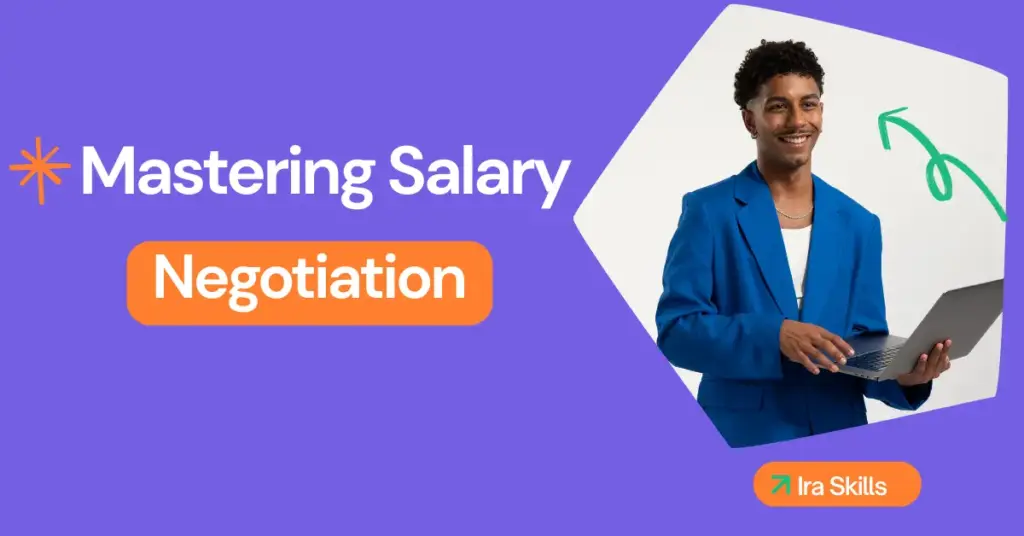How do you think salary negotiations shall be approached?
If your answer is through numbers, market benchmarks
and by reffering to what others are getting paid, then pardon to say but you are not getting any big promotion!
Because, salary negotiation isn’t about numbers—it’s about impact!
So, if you’re only asking for a particular percentage hike then you’re not really negotiating. You’re just adjusting to company trends.
Real salary negotiation happens when you make the company see your value!
The Two Types of Salary Negotiations
Let’s first clear this! There are two ways of getting a raise–
1. Market-Driven Raise (Passive Negotiation)
This is not real negotiation. It happens automatically.
- If the company is doing well, salaries increase.
- Inflation, industry standards, and competition push salaries up.
- You don’t need to prove your worth—it’s just part of the system.
It’s like getting a 25-30% raise along with the crowd. So, if you think that you’re negotiating this, then you are very wrong because you’re just accepting what’s given.
2. Value-Driven Raise (Real Negotiation)
This is where you take control!
Now, here if you are saying, “I want ₹60 LPA.” then take a pause because clearly you won’t get this straightforward!
You, rather need to ask this– “How much do you value my experience, knowledge, and impact?”
Companies don’t pay for job titles. They pay for results.
If you can prove:
✅ You solved major problems
✅ You improved efficiency
✅ You increased revenue
✅ You transformed processes
Then the conversation shifts from “salary” to ROI (Return on Investment).
How to Convince Them?
Here’s how to shift the conversation from “how much salary can I get?” to “how much impact have I created?”
1. Quantify Your Impact
Avoid vague statements like:
🚫 “I work really hard.”
🚫 “I manage a team.”
Instead, say:
✅ “I streamlined the sales funnel, increasing conversions by 30%.”
✅ “I led a team of 10 and improved productivity by 40%.”
✅ “I automated manual tasks, saving the company 500+ hours annually.”
Numbers speak louder than words.
2. Align with Business Goals
Your manager doesn’t care about how much effort you put in. They care about results.
- Did you boost revenue?
- Did you reduce costs?
- Did you make processes more efficient?
Your value should be unignorable.
3. Tell a Story
People don’t remember stats—they remember stories.
🚫 Instead of: “I increased revenue by 10%.”
✅ Say: “When I joined, the company was struggling with client retention. I introduced a new engagement strategy that not only retained clients but also increased repeat purchases, leading to a 10% revenue boost.”
Make them see your contribution.
4. Flip the Script
Instead of demanding a number, ask them:
“What do you think is fair compensation for someone delivering these results?”
This forces them to recognise your impact.
Once they see your value, they’ll know you’re not just another employee—you’re an asset.
Are You Ready for Salary Negotiation?
Now, all of the above is fine but do you have the fire what which you are demanding?
Now, what does this mean!
It means to answer each of the following questions with a positive reply–
- Do I have skills that make me indispensable?
- Can I prove my impact with real data?
- Do I truly believe I deserve a higher salary?
If yes, then you’re ready to negotiate.
If you can say:
1. “I built a strategy that increased revenue by ₹3 crores per month.”
2. “I optimized processes, saving ₹50 lakhs in costs.”
3. “I led a team that turned a failing project into a ₹10 crore success.”
Then the question is not “Will I get a hike?” but “How much?”
Because if you bring ₹3 crores a month, why wouldn’t they pay you 4% of that?
Now, here at this place of your answer is negative then you need to start working on your skills and this is where IRA SKills comes in– we train professionals on latest in damamd skills. So if you want to get started, we are here to help you out!
How NOT to Negotiate Salary
❌ The Wrong Way
Employee: “I’ve been working here for two years, so I deserve a raise.”
HR: “Why do you think so?” Employee: “I’ve been consistent and handled a lot of work.”
HR: “That’s part of your job, isn’t it?”
Negotiation failed.
Why?
Because this approach is based on entitlement, not impact.
HR doesn’t care how long you’ve been working. They care about results.
✅ The Right Way
Employee: “I’d love to discuss my salary based on my impact.”
HR: “Sure, tell me more.”
Employee: “In the past year, I improved our lead generation process, increasing conversions by 40%, which brought in ₹5 crores in revenue. If I continue at this pace, the company stands to gain ₹60 crores over the next five years. Given this, I’d like to discuss adjusting my compensation to reflect my contribution.”
HR: “That’s impressive. Let’s talk numbers.”
Negotiation won!
Now, instead of seeing you as an employee asking for a raise, HR sees you as a revenue generator.
Powerful Phrases to Use in Negotiation
🚫 Don’t say:
- “I need a higher salary because of inflation.”
- “I’ve been here for three years, so I deserve more.”
- “Other companies are paying more for this role.”
✅ Instead, say:
- “The work I’ve done has directly contributed to ₹X crores in revenue. I believe my compensation should reflect this.”
- “I’ve taken initiatives that led to [specific impact]. Let’s discuss a compensation structure that aligns with this growth.”
- “The market values this role at ₹X, but my contributions exceed standard expectations. Let’s discuss a package that acknowledges that.”
These statements put you in control.
Key Points to Remember
- Confidence is everything. If you don’t believe in your worth, they won’t either.
- Never negotiate based on emotions. Use data and impact.
- Don’t start with a number. Start with value. Numbers come later.
- Silence is powerful. After stating your case, wait. Let them process.
- Know when to walk away. If they don’t see your worth, someone else will.
Final Thought
Salary negotiation isn’t about asking for a random raise. It’s about proving that a raise is inevitable.
If you can prove your work contributes significantly to the company’s success, you won’t have to ask for a raise.
They’ll offer it to keep you.
And, if you lag in the skills to grp a hike– IRA Skills is here to help you get through!
You can put a check on all the skills required to get a hike by learning the in demand skills for which we are here to guide at each step!

 Login
Login










